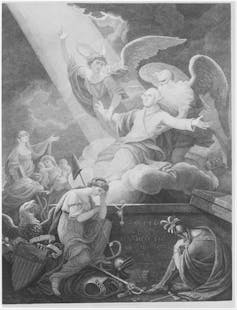Peter Hall,
March 27, 2025

Pennsylvania Sen.-elect James Malone with his co-campaign managers Stella Sexton (left) and Joyce Smith. (contributed photo/Stella Sexton)
If Gov. Josh Shapiro was able to win in deep-red Lancaster County, Democratic state Sen.-elect James Malone could too, his campaign co-manager Stella Sexton said.
Shapiro won the 36th Senate District in 2022 with a 0.2% margin over his Republican opponent, Trump-aligned Sen. Doug Mastriano (R-Franklin).
“If we could get to Shapiro-Mastriano numbers, I knew we could take this,” Stella Sexton, told the Capital-Star about the campaign’s approach to flipping the long-time Republican Senate district.
Malone did better with a stunning upset in the 36th District special election Tuesday. He beat Republican County Commissioner Joshua Parsons by 0.89%, according to unofficial results, and became the first Democrat to represent Lancaster County in the Pennsylvania Senate since 1879.
Parsons conceded Wednesday afternoon, saying in a post on the social media platform X that a review of the remaining ballots showed there were not enough uncounted votes to change the outcome.
Having reviewed the numbers from last night, including the fact that there are not enough provisional or other outstanding ballots to change the overall result, I have called Mayor Malone to congratulate him and wish him the best.
1/2
— Josh Parsons (@Josh__Parsons) March 26, 2025
The Democratic victory drew national attention as the latest in a string of special election wins across the country. Although it did not change control of the Senate, it reduced Republicans’ majority in the Senate to 27-23.
Ryan Aument, who ran unopposed for the seat in 2022, resigned last year to work for U.S. Sen. Dave McCormick.
Democrats attribute the win, in part, to voters who feel betrayed by what they describe as President Donald Trump’s draconian and tumultuous first months in office.
“Folks are not happy with the chaos that we’re seeing in Washington and are not happy with Parsons,” Malone said, recounting what he heard from voters as he knocked on doors across the district, which President Donald Trump won by more than 15%.
Parsons campaigned on his reputation as a conservative firebrand who defied the state-ordered lockdown during the COVID-19 emergency, an abortion opponent and Trump ally.
But he also drew national attention for his harassment of a reporter at Lancaster Online/LNP and stoking anger over a drag queen story hour at Lancaster Public Library. The library ultimately canceled the event when a bomb threat and suspicious package shut down downtown Lancaster in March 2024.
“A lot of what we heard was they didn’t like his negativity and they didn’t like that he was voting against them,” Malone said.
Efforts to reach Parsons on Wednesday through his campaign’s website, Facebook page and campaign officials were unsuccessful.
A Republican official blamed Parsons’ defeat on a loss of focus after the 2024 election.
“This is a wake up call. We can’t rest on the laurels of last November’s great victories,” Pennsylvania GOP Chairman Greg Rothman said in a post. “We can’t be complacent and we must be unified. We need to keep the intensity of 2024 and fight together for every vote.”
Franklin & Marshall College pollster Berwood Yost said the outcome was both surprising and followed a trend so far in 2025.
“When you have a Republican who loses the district with a 23 point registration advantage, that qualifies as a surprise,” Yost said.
At the same time, Democrats have won five special elections across the country this year, Yost noted. That has a lot to do with the electorate in special elections, when turnout is typically low. In Lancaster county, 29% or about 54,000 registered voters participated.
The emphasis for national Democrats on Tuesday was the special election for the 35th House District in Allegheny County, where the party focused efforts to defend the one-seat majority it won in November. The seat was left empty in January when Rep. Matthew Gergely died after suffering a medical emergency.
Democrat Dan Goughnour won the election with 63.4% of the vote, according to unofficial results.
Special election voters tend to be more tuned-in and have more education, which favors Democrats, Yost said. It also tracks trends following presidential elections, when there is typically a swing toward the party not in the White House or in the majority in Washington.
“When you look back to Trump’s first term, there was a big swing toward Democrats in special elections at that time,” Yost said.
State Rep. Nikki Rivera (D-Lancaster) said Malone was a perfect foil to Parsons, who espoused many positions of the MAGA movement.
As the mayor of East Petersburg, a borough of about 4,500 people a short distance from Lancaster, Malone earned a reputation as a person who leads by example and shows genuine concern and compassion for people.
“He’s known for being personable and connecting with people on all sides of a topic,” Rivera said. “He is truly able to cross party lines to understand and be understood.”
But outside his small community, Malone had “almost no name recognition,” Sexton said. That called for a grassroots effort to introduce him to voters in more than two dozen municipalities.
Sexton said she found inspiration in Iowa Democrat Mike Zimmer’s victory, flipping a state Senate seat in January.
“I reached out to them and said we have to know how you did it,” Sexton said. “They gave us their whole plan.”
Lancaster Democrats enlisted phone banking help from county committees across Pennsylvania and launched a ground game that included “obsessively” tracking mail ballots and dispatching volunteers to retirement communities to follow up with voters, Sexton said.
She said Malone worked hard, meeting voters and attending a League of Women Voters forum that Parsons skipped. Libertarian Zachary Moore of Mount Joy was there too, and won 480 votes, almost exactly the margin by which Parsons lost, Sexton noted.
Sexton said Malone’s campaign spent about $215,000, an amount she estimates is tied with or slightly greater than Parsons’ spending. Campaign finance reports show money continued to flow to the candidates in the final 24 hours of the race.
Parsons’s campaign was supported by GOP activist Scott Presler, who helped turn out Amish voters in the 2024 general election. Presler, who has drawn criticism for his anti-Muslim language, rung early alarm bells about a possible Democratic victory, drawing the attention of billionaire megadonor Elon Musk, Lancaster Online reported this week.
Sexton said Musk’s post came too late to help Parsons’ fundraising. But it reinforced Malone’s message.
“Parsons was really being supported by billionaires and ours was a grassroots campaign and that was really a contrast that resonated with people,” Sexton said.
When Pressler posted on X late Tuesday night lamenting Parsons’ apparent loss, Musk replied with a one-word post: “Damn.”









